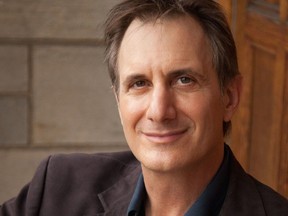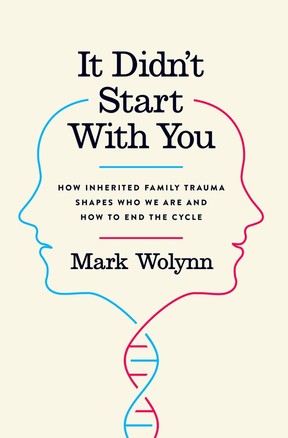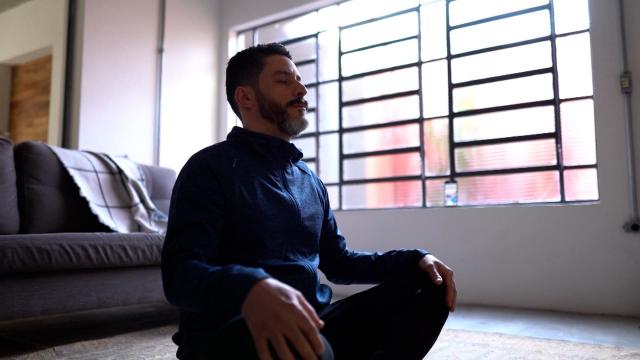Books
Q and A: Can trauma be inherited?
In his new book, Mark Wolynn suggests personal challenges can be overcome by addressing traumatic legacies from your family's past.
Author of the article:The Vancouver Sun
Publishing date:Aug 02, 2016 •

Mark Wolynn, author of It Didn't Start with You. PHOTO BY HANDOUT /PNG
Article content
It Didn’t Start With You: How Inherited Family Trauma Shapes Who We Are and How To End The Cycle
Three Tips for Reworking Your Subconscious Mindmenu

Three Tips for Reworking Your Subconscious Mind
Article content

It Didn’t Start With You: How Inherited Family Trauma Shapes Who We Are and How To End The Cycle
Three Tips for Reworking Your Subconscious Mindmenu

Three Tips for Reworking Your Subconscious Mind
Sometimes it can be hard to take a few minutes to be present. However, just a few moments of taking time to be aware of your subconscious can allow you to free yourself from anxiety, addictions, and bad habits, according to Ryan Haddon, life coach, and meditation teacher. Haddon joined Cheddar News to share tips on how to rework your subconscious mind. “If you want to change your life you want to start being aware of the subconscious," he said.
By Mark Wolynn
Viking
Mark Wolynn is the director of The Family Constellation Institute in San Francisco and a leading expert on inherited family trauma. His new book, It Didn’t Start With You, is a transformative approach to resolving traumatic legacies passed down in families over generations, that in many cases, traditional therapy, drugs, or other interventions have not had the capacity to touch.
Q.Tell us about your book.
A. It Didn’t Start With You shows how the unexplained fears, anxieties and depression we struggle with might not be our own. These feelings can stem from traumas in our family history that we have biologically inherited from our parents and grandparents, and the pattern doesn’t have to continue. In the book, I teach people how to become their own detectives, uncovering the clues and making the links that will set them free. When people make the connection between the trauma language they carry and the traumatic events that lie at the root, they can break the cycle. The last third of the book is devoted to learning practices and having experiences designed to change how our brains function so we can feel better.
Q. You write about how a personal experience with severe loss of vision led to your research – can you tell us about that?
A. About 25 years ago, I began to lose the vision in one of my eyes from a chronic form of retinopathy. The doctors couldn’t cure it. Instead, they told me that I’d most likely also lose the vision in my other eye. Terrified and desperate to find help, I went on a search to find answers, a search that led me halfway around the globe to learn from several wise teachers who taught me some fundamental principles — one of which was the importance of healing my relationship with my parents. But before I could do that, I had to heal what stood in the way — inherited family trauma — specifically the anxiety I had unknowingly inherited from my grandparents who all lost their mothers when they were small. This anxiety was the real cause of my vision loss. After working it through, my sight came back. Afterwards, I felt compelled to share what I learned, and ultimately developed a method for healing the effects of inherited family trauma.
Q.How can exploring our family histories help us to be successful?
A. When we find ourselves reliving aspects of traumatic experiences that have taken place in our family history — experiences ranging from ancestors who faced poverty, oppression or forced relocation, to family members who failed or received wrongful inheritances, to relatives who were cheated or who cheated others — all these can hinder how success flows to us or how well we’re able to receive it. Once we make the link to these events, we can resolve the influences they may have on us, and we can become freer to flourish and achieve the goals we set. I once worked with a man who couldn’t hold onto any of the money he made. It wasn’t until he looked at the way his grandfather had cheated the workers in his factory to amass his fortune that the grandson’s misfortune could change.
If we’re struggling to be successful in our career, health or relationships, it’s important to look at the unconscious influences that might be holding us back. It’s important to shake the family tree and see what falls out. What family secrets have been hidden? What stories didn’t get told? What traumas have never healed? It can be important to know these things, especially if we’re unconsciously reliving elements of traumas that don’t belong to us. If we ignore the past, it can come back to haunt us. If we explore it, we don’t have to repeat it. We can break these destructive patterns.
Q.Many survivors of Canadian residential schools report experiencing depression, anxiety, addiction, suicidal inclinations and rage – are these symptoms consistent with inherited family trauma?
A. They can be, yes. I’ve seen many people whose families have experienced great traumas—whether it’s from the Holocaust, or slavery, or massacres, or being sent away to residential schools — and in the generations that follow, there are often remnants of these traumas. We can see generational patterns of depression, anxiety and addiction, as well as a continuation of families being forcibly broken apart, parents who don’t get to raise their children, children who don’t get to be raised by their parents, and more. In fact, much of the current research on inherited family trauma has been based on groups of people who’ve suffered due to their race, religion, culture or nationality — Cambodians, Rwandans, Holocaust survivors, Native Americans, African Americans and others. The methods and tools I share in the book are helpful in healing these wounds.
